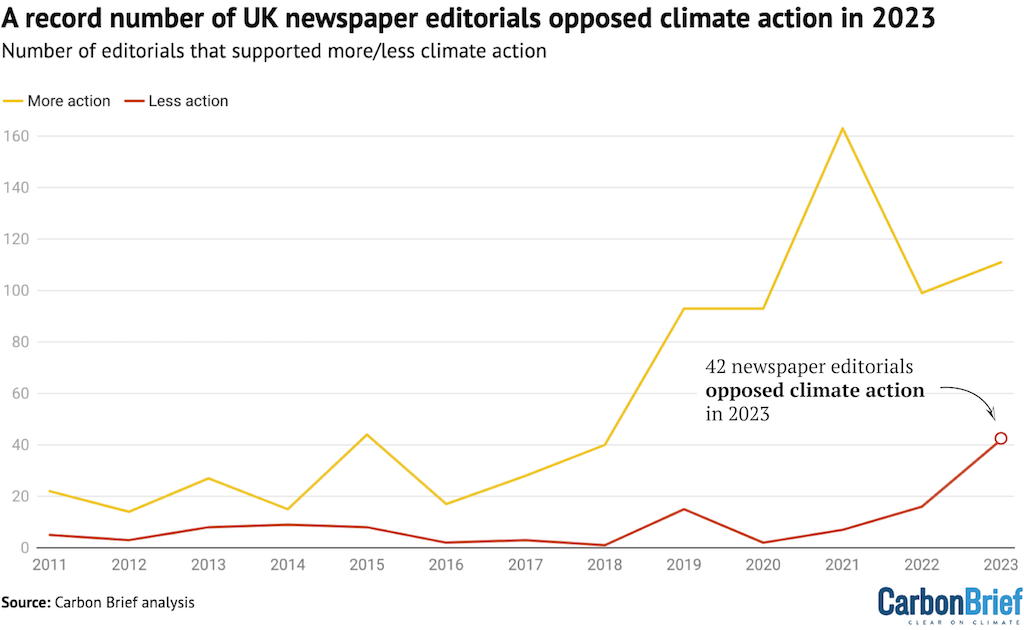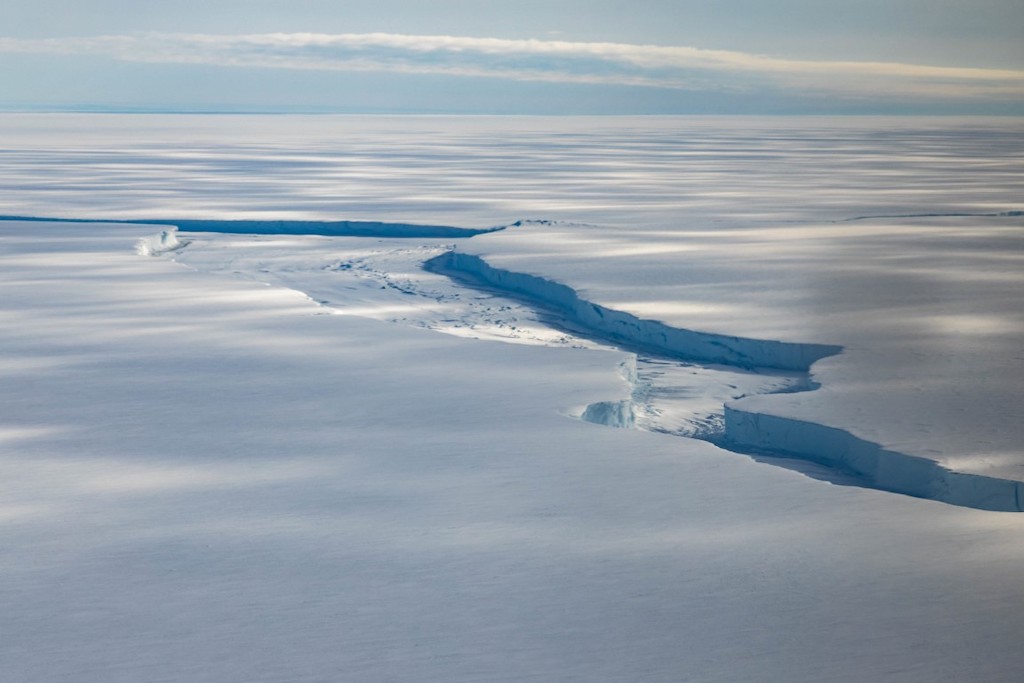
DeBriefed 12 January: 2023 ‘smashes’ global heat record; UK MP quits over oil and gas; Studying Antarctica’s mammoth icebergs
Daisy Dunne
01.12.24Daisy Dunne
12.01.2024 | 4:08pmWelcome to Carbon Brief’s DeBriefed.
An essential guide to the week’s key developments relating to climate change.
This is an online version of Carbon Brief’s weekly DeBriefed email newsletter. Subscribe for free here.
This week
2023 ‘smashes’ records
RECORD-SHATTERING: 2023 “smashed” the record for the hottest year by a large margin, reported the Guardian. The newspaper said on Tuesday that, according to the EU’s Copernicus Climate Change Service, 2023 was 1.48C hotter than pre-industrial times. This is 0.17C higher than the last record set in 2016 – “marking a very large increase in climate terms”, according to the Guardian. And today the record was confirmed by the UN’s World Meteorological Organization, which has just published the findings of six leading climate datasets.
CHARTING CHANGE: In its coverage of the data, BBC News produced a number of charts and figures illustrating the path of global warming. Its analysis showed that almost every day since July has seen a new global air temperature high for the time of year. Meanwhile, the Independent published a feature examining whether 2024 could be even hotter than 2023.
STATE OF THE CLIMATE: Carbon Brief has just published the last of its quarterly state of the climate updates for 2023. It explains that 2023 was the warmest year “by a large margin”, at between 1.34C and 1.54C above pre-industrial levels across different datasets. Last year was also the warmest on record for ocean heat content, which increased notably between 2022 and 2023.
UK MP quits over fossil fuels
‘TRAGEDY’: The UK’s former energy minister Chris Skidmore quit as an MP in protest at the government’s plans to drill for more oil and gas in the North Sea, the Financial Times reported. In his resignation letter, Skidmore said it was “a tragedy that the UK has been allowed to lose its climate leadership” under prime minister Rishi Sunak, according to the newspaper.
BILL DELAYED: Skidmore quit over the government’s offshore petroleum licensing bill, which aims to “maximise” new oil and gas production, the FT said. The bill was due to be read in the House of Commons this week, but ended up being postponed, the Times reported. BBC News reported that Sir Alok Sharma, the Conservative MP and COP26 president, said he would vote against the bill, calling it “a total distraction” which reinforces the idea the UK is “not serious” about tackling climate change.
Renewables on the rise
RECORD RENEWABLES: A boom in Chinese solar power drove another record-breaking year of renewables growth in 2023, according to a new International Energy Agency (IEA) report covered by Carbon Brief. The world is now on track to build enough solar, wind and other renewables over the next five years to power the equivalent of the US and Canada combined, according to Carbon Brief’s analysis of the findings.
UK SOLAR: Along with the increase in global renewable capacity, there has been continued growth in low-carbon upgrades on UK homes, with solar and heat pumps driving record installations in 2023, according to separate Carbon Brief analysis.
Around the world
- US COAL DROP: US emissions fell by 1.9% in 2023, largely due to coal declining to its lowest level in 50 years, the New York Times reported. By contrast, US oil and gas production is set to hit a record in 2024 and 2025, said the Financial Times.
- ‘A LA CARTE’: Saudi Arabia’s energy minister has claimed that the headline COP28 agreement to transition away from fossil fuels is just one of several “choices” on an “a la carte menu”, reported Climate Home News.
- WAR EMISSIONS: Israel’s assault on Gaza since 7 October has produced more greenhouse gas emissions than 20 of the world’s most climate-vulnerable countries create in a year, according to new analysis covered by the Guardian.
- GERMANY PROTESTS: Farmers took to the streets of Berlin to protest against the German government’s decision to cut agricultural subsidies, Deutsche Welle reported.
- DEEP SEA MINING: Norway has become the first nation to approve commercial deep-sea mining, opening up a vast area of the Arctic to the extractive practice despite warnings from scientists, Mongabay reported.
- OFFSETS CONTROVERSY: The first-ever carbon-offset exchange under a new Paris Agreement mechanism, involving Switzerland buying credits for the rollout of electric buses in Thailand, is facing integrity questions, Climate Home News said.
40%
The proportion of North Sea oil and gas licences in UK waters owned by foreign companies and investors, according to EnergyMonitor.
Latest climate research
- A new research paper in Nature Climate Change presented a “conceptual framework” for considering the role of justice within climate research.
- The presence of urban green space is associated with “significantly lower rates of violent crime committed outside”, according to an International Journal of Biometeorology study conducted in Australia.
- A pair of studies in the Journal of Climate delved into an “exceptional heatwave” in east Antarctica in 2022, which brought “widespread 30-40C temperature anomalies across the ice sheet”.
(For more, see Carbon Brief’s in-depth daily summaries of the top climate news stories on Monday, Tuesday, Wednesday, Thursday and Friday.)
Captured

A record 42 editorials opposing action to tackle climate change were published by UK newspapers in 2023, according to new Carbon Brief analysis. Written almost exclusively by right-leaning papers, these editorials called for delays to UK bans on the sale of fossil fuel-powered cars and boilers, as well as for more oil-and-gas production in the North Sea, according to the findings. In response to such demands, prime minister Rishi Sunak performed a “U-turn” in September on some of his government’s major net-zero policies.
Spotlight
Investigating Antarctica’s colossal icebergs
This week, Carbon Brief speaks to Dr Oliver Marsh, a glaciologist who is principal investigator of a British Antarctic Survey (BAS) mission currently studying iceberg calving events at Antarctica’s Brunt ice shelf (pictured).

Carbon Brief: Can you please explain what fieldwork you are currently working on?
Dr Oliver Marsh: We are drilling ice cores to collect ice samples from the Brunt ice shelf. These will be brought back to Cambridge [where BAS is located] and University College London (UCL) in order to test their physical and chemical properties. We are also setting up seismic and GPS equipment to monitor fracture growth and strain rates on the ice shelf. We will then link the properties of the ice to the behaviour of the fractures.
CB: What do you hope to find out by conducting this fieldwork?
OM: We are interested in the mechanism and timing of crack growth leading to iceberg calving [where chunks of ice break off from the front of a glacier]. In particular, we want to understand how changes in ice properties change calving rates. The ice shelf we are working on has a well-documented history of crack growth, with two large calving events in the last three years, and the new information we gain from precise laboratory measurements will help us to understand how – and under what conditions – fractures occur in the lead-up to these calving events.
CB: What are the biggest hazards with conducting fieldwork on the Brunt ice shelf?
OM: The Brunt ice shelf is a good location to monitor fracture growth due to its dynamic behaviour. This means there are rifts and other cracks in the ice that can be hazardous for travel. These cracks are heavily monitored with a suite of geophysical instruments, including ground-penetrating radar, GPS and satellite data, and precautions are taken when moving around. Fieldwork in Antarctica also has significant hazards associated with the weather, for example, strong winds and wind chill.
CB: How is climate change affecting iceberg calving events in Antarctica?
OM: Calving occurs as a normal process of ice loss from the continent. But, as it occurs in discrete events and very infrequently for some ice shelves, it is difficult to determine whether rates are changing from a short satellite record. Other fracturing processes, such as hydrofracture and ice shelf collapse, are linked to both ocean and atmospheric warming, so it is possible that calving rates may increase in the future.
CB: What would be the implications of accelerated iceberg calving for the climate and ecosystems?
OM: Increased calving is likely to weaken ice shelves that fringe the continent and support the glaciers inland. This can help to speed up glacier flow and ice loss to the ocean, contributing to sea level rise. An increase in the volume of icebergs may also cause issues for ecosystems, particularly in areas where icebergs ground on the ocean floor, blocking foraging routes for penguins and seals, for instance.
Watch, read, listen
IDAI AFTERMATH: An audio documentary from the BBC World Service explored how communities in Beira, Mozambique are still reeling five years after Cyclone Idai.
PEOPLE FIRST: Context spoke to a range of experts about how the deal to transition away from fossil fuels agreed at COP28 can be achieved in a way that prioritises people’s needs.
INFLECTION POINTS: Robinson Meyer, founding editor of the climate publication Heatmap, appeared on the Chris Hayes Podcast to talk about rising fossil fuels and falling low-carbon technology prices.
Coming up
- 13 January: Taiwan presidential and parliamentary elections
- 15-19 January: World Economic Forum, Davos, Switzerland
- 16-19 January: 60th session of the Intergovernmental Panel on Climate Change, Istanbul, Turkey
- 17-18 January: G20 women’s sustainability working group meeting, Vila do Conde, Brazil
Pick of the jobs
- Global Forest Coalition, director | Salary: €32.50 per hour. Location: Remote
- The New York Times, Climate Forward editor | Salary: $170,000-180,000. Location: New York
- Department for Energy Security and Net Zero, deputy director, strategy development | Salary: £75,000. Location: Choice of various UK cities
DeBriefed is edited by Daisy Dunne. Please send any tips or feedback to [email protected]
